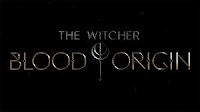In an apparent effort to save interest in Netflix's The Witcher (and its spinoff), the show seemingly leaked information (cf, via the podcast Deux U) to attack Henry Cavill directly. At the time it came out I mentioned that I thought it was poorly conceived damage control that grossly underestimated the good will Cavill has bought over his career. The tactics themselves are by-the-book for how entertainment corporations handle or anticipate criticism (the fan baiting approach I covered back in September). This effort failed so badly (gaining no traction) that the leaker apologized (eg) and deleted their Twitter account and the accusations never surfaced in the trades (although places like Jezebel and click-chasers like The Quartering reported them). It's heartening to see such a quick obliteration of this nonsense, and I hope its a sign we're beginning to turn the corner on the insanity that's consumed the entertainment industry the last six to seven years. But more about Blood Origin below.
Speaking of Cavill, he's now an executive producer for a Warhammer 40k series on Amazon. Thankfully, Amazon is simply the broadcaster and not involved with creative decisions, so there's a chance the IP will be (if nothing else) faithful to the lore. I'm not that familiar with Warhammer, but I know the book series' is quite popular. Fans don't always succeed when given a project like this, but Cavill isn't just an enthusiast so there's a reasonable chance it will do well. What's less clear to me how Jennifer Salke decides what is 'toxic masculinity' and what is not--Conan, as we know, was too toxic for her, and Tolkien's legendarium too masculine, but one wonders if what Salke means is purely down to numbers (white men vs female/diverse characters). I assume Warhammer is diverse, but otherwise on the surface it's not something I would have guessed Salke would approve of.
We've heard enough from those involved with Rings of Power season two that nothing meaningful will change besides superficial elements like more action (and minor aesthetics). This dooms the show to another poorly received season and I really wonder if Amazon will actually swallow the cost to produce the promised third season. I think it's unlikely, but given Bezos' deep pockets and ego, it's not impossible (the unwatchable Star Trek: Discovery has managed to crawl along for five seasons despite abysmal viewership, after all).
One thing I've seen no one consider is why the critical reception of these two shows has been so different. Both have been eviscerated by the audience (RT scores of 12% and 34%), but why was Willow given a pass (85%) and Blood Origin (correctly) criticized (35%)? I think it's down to corporate influence. Disney (Willow) desperately needs a streaming 'win', so ensured they got the usual thumbs-up from critics. Netflix, on the other hand, was already pulling away from Blood Origin (cutting its episode count from six to four), so wasn't investing in a critical pass. I've mentioned ad nauseum that critical praise is meaningless in terms of success, so both shows will be one-and-done, but executives haven't figured this out. Blood Origin's abysmal showing should mean The Witcher season three will mercifully end the Netflix experience. What I'd like is someone to adapt CDPR's iteration of the IP (ala Edgerunners, albeit it needn't be animated).
You'd be forgiven if you had no idea Dragon Age: Absolution had appeared appeared on Netflix (December 9th). The animated show, DA's first venture into animation since early 2012's Dawn of the Seeker, is meant to help lead in to Dragon Age 4 (presumed out in 2024), but has arrived DOA. No one is talking about it, so no one is watching it (a far more muted response than Vox Machina and nowhere near monster performers like Edgerunners). What it means to BioWare is they can't hope fans have watched it, making it as irrelevant as the book and comic tie-ins have to be (& ergo, failing in its purpose to hype the upcoming game). Reviews suggest BioWare's writing remains stuck in the 'made for modern audiences' phase that every other flop from the last few years has copied. It makes me fear the game will receive a similar indifferent reception and possibly even flop Andromeda-style. It's worth noting that Willow (included above) also has had no resonance at all (as is clear in the graph).
Note on Future Articles
While I'm fond of the news digest format I've been doing since 2017, I'm going to switch to topic-based posts. This will mean articles will be more frequent (if, generally, shorter). I'm sure at points it will be worthwhile to post a digest, but for readers I think it makes coming regularly more rewarding and it's simpler to know if the topic at hand is of interest. [Later: this intention didn't quite pan out, although longer single topic articles are in process.]
This article was written by Peter Levi











No comments:
Post a Comment